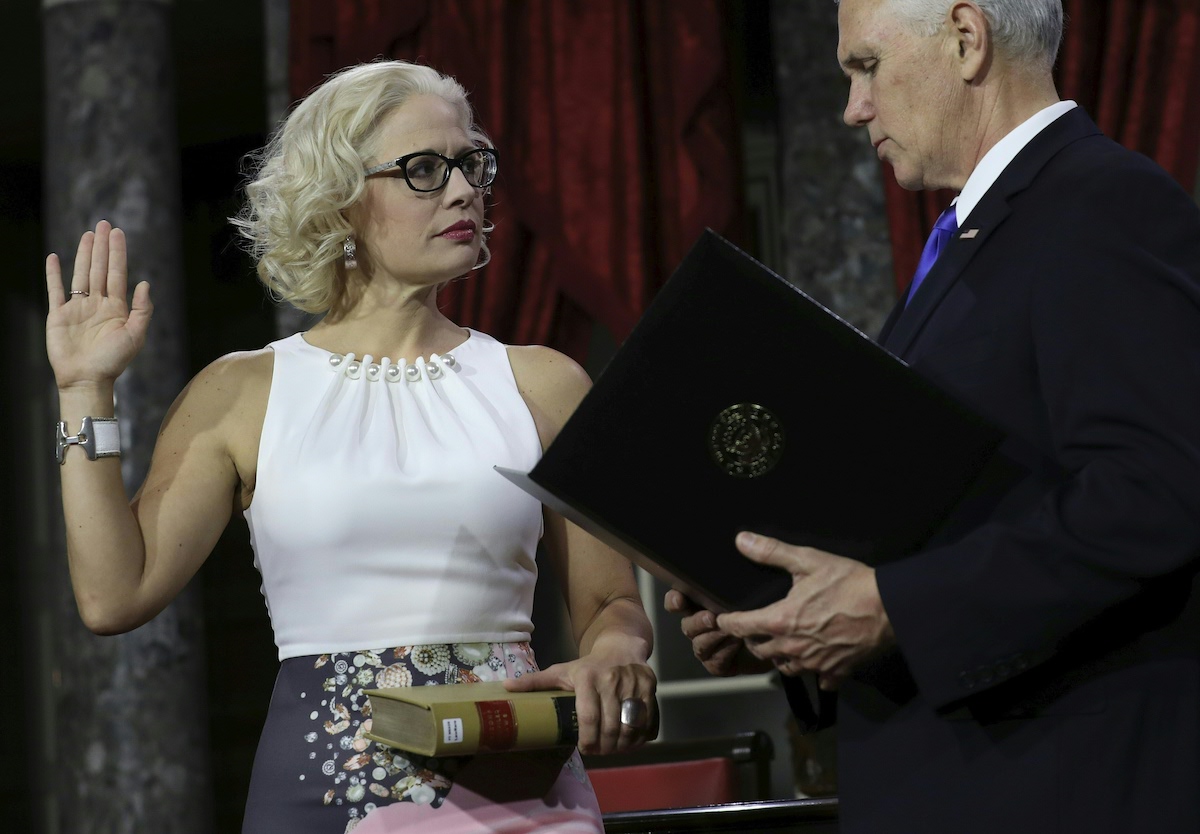Following the recent, intense online backlash against Sen. Kyrsten Sinema for appearing to joyfully vote “no” to increase the minimum wage to $15 last week, Sen. Sinema’s office has responded to this criticism by calling it sexist.
Did Sinema really have vote against a $15 minimum wage for 24 million people like this? pic.twitter.com/Jv0UXLKLHI
— Sawyer Hackett (@SawyerHackett) March 5, 2021
“Commentary about a female senator’s body language, clothing, or physical demeanor does not belong in a serious media outlet,” Hannah Hurley, a spokesperson for Sinema, told HuffPost, when asked about the Senator’s notably exaggerated thumbs down vote for the bill.
But not only is criticizing female politicians for their legislative actions and policy stances—especially when they seem happy to reject a bill that would help millions of underpaid, disproportionately women workers—actually not sexist, it’s also crucial to advancing feminism—that is, if your feminism extends beyond indeterminately supporting white women in positions of power, to the six out of 10 minimum wage earners who are women.
Our disdain for sexism can’t be selective, or only applied to wealthy white women who face very valid public scrutiny for hurting those with less power than them. Feminism that actually improves the lives and material conditions of the most marginalized women and people requires us to recognize that voting against a $15 minimum wage is inherently sexist, as women and women of color comprise the majority of low-wage workers.
Low-wage workers, and especially those who are women and women of color, aren’t just underpaid and often uninsured, but they also often face extremely dangerous and exploitative working conditions. On top of being placed at higher risk of exposure to COVID, women workers in the service industry, and especially tipped workers, also face endemic sexual harassment and assault, and still struggle to make ends meet for themselves and their families.
Of course, raising the minimum wage to $15 isn’t just a feminist policy stance—it’s also a politically popular one. The majority of Democratic, Republican, and Independent voters support raising the minimum wage. And contrary to defenses of Sinema that claim she had to vote against the bill to keep her seat in the politically mixed state of Arizona, Sinema’s fellow Democratic Senator representing Arizona voted to raise the wage to $15.
It’s true that Sinema is largely shouldering the brunt of online criticism for her vote, despite being just one of eight Democrats to reject the bill. But while every senator that voted to keep starvation wages for workers on the frontlines of the pandemic deserves to face accountability, Sinema’s apparently smug, even happy thumbs down vote, not to mention her choice to share cake on the Senate floor to celebrate afterward, was inappropriate, regardless of gender.
It’s not an exaggeration to say that people are dying, and minimum wage earners are struggling to afford essential resources like food, housing, and health care amid a deadly public health crisis and recession. As if voting to deny workers a living wage weren’t harmful enough, Sinema didn’t have to make light of her vote, or the millions of struggling, disproportionately female workers who will be affected by it.
In a country where women still comprise the minority of elected offices, and continue to face significant political barriers, it’s crucial to speak out against the very real and at times violent sexism women politicians continue to face. After all, just two months ago, armed rioters stormed the Capitol specifically looking for Speaker Pelosi and Rep. Alexandria Ocasio-Cortez.
Women politicians regularly face heightened scrutiny, especially online, for everything from how they dress to the cadence of their voice, and that scrutiny is often gendered, vicious, and explicitly threatening. We can criticize Sinema for her vote, and also stand up against the persistent misogyny to which female politicians like Sinema are routinely subjected.
The reality of violent sexism targeting women politicians can be true at the same time as the reality that many women politicians take legislative actions that are harmful, even devastating, for women with significantly less power and privilege than them. And it’s crucial—and feminist—to hold anyone in a position of power accountable when they harm women and marginalized people, regardless of any facet of their identity.
(image: ALEX EDELMAN/AFP/Getty Images)
Want more stories like this? Become a subscriber and support the site!
—The Mary Sue has a strict comment policy that forbids, but is not limited to, personal insults toward anyone, hate speech, and trolling.—









Published: Mar 10, 2021 11:24 am